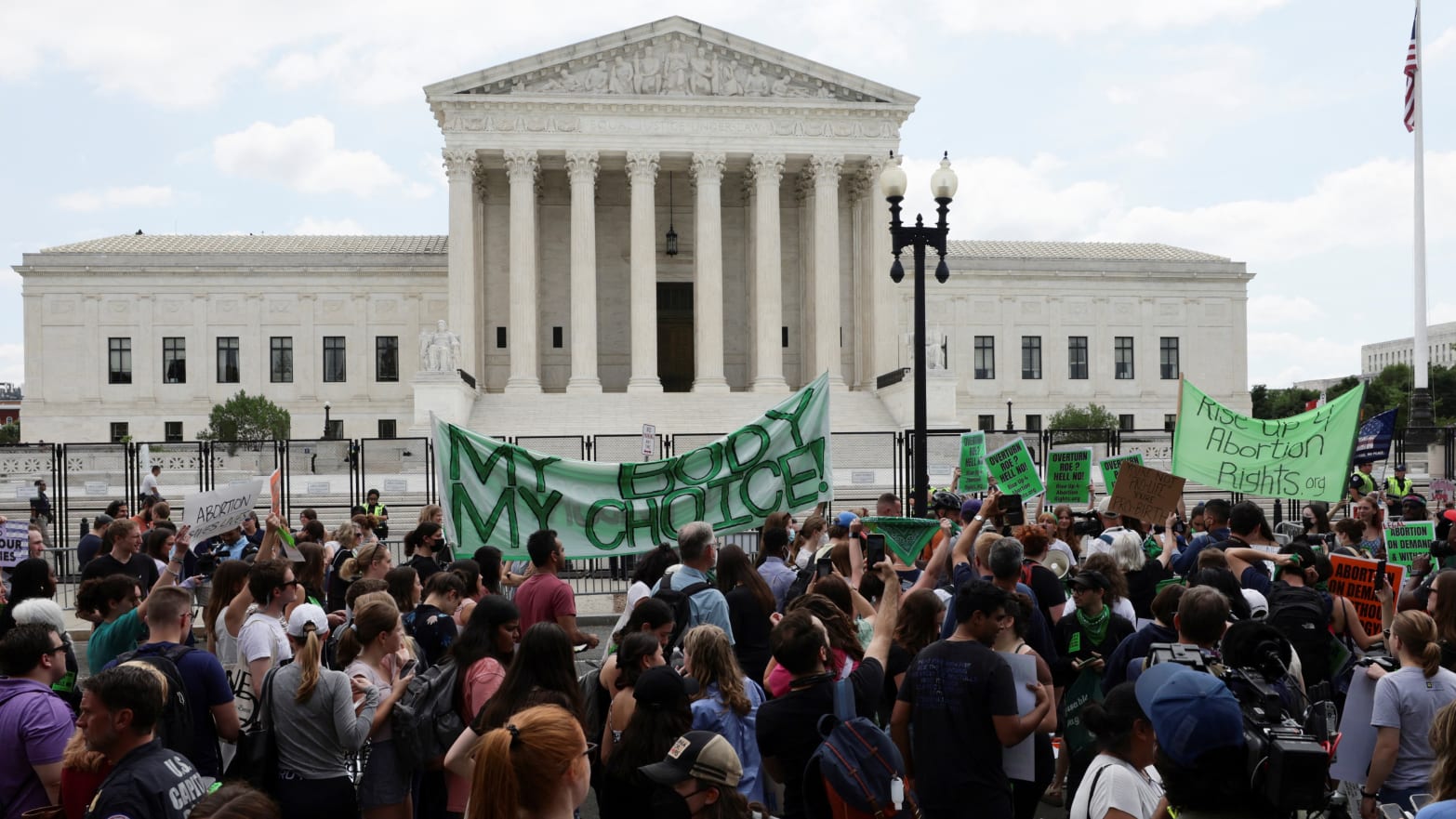Nearly half a century after the Supreme Court ruled that the ability to end a pregnancy was a constitutional right, the nation’s highest court has overturned Roe v. Wade.
The majority opinion, authored by Justice Samuel Alito, ruled that the 1973 decision was wrong in its determination that an implied right to privacy in the U.S. Constitution protected a patient’s decision to have an abortion.
“The Constitution does not confer a right to abortion; Roe and Casey are overruled,” Alito wrote for the 6-3 majority. “The authority to regulate abortion is returned to the people and their elected representatives.”
The decision effectively ends abortion access for roughly 40 million women and girls in nearly two dozen states across the country. Thirteen of those states have pre-emptively enacted “trigger laws” intended to impose severe restrictions on the procedure in the event of a Supreme Court ruling overturning Roe. Others have pre-Roe bans that remain on the books or have passed subsequent laws that have been blocked by federal courts.
Most of the laws, many of which take immediate effect, make exceptions only in cases where pregnancy is the result of rape or incest, or if an abortion is necessary to save a patient’s life.
The ruling is the culmination of five decades of legal, political, and social action by abortion opponents, whose previous efforts to impose limitations on the procedure were stymied by Supreme Court precedent. A similar case brought before the court in 1992, Casey v. Planned Parenthood, reaffirmed the protections provided in Roe.
But a shift in the Supreme Court’s composition during the Trump administration gave hope to abortion opponents that justices could rule to overturn Roe.
Alito was joined in the opinion by Justices Amy Coney Barrett, Neil Gorsuch, Brett Kavanaugh, and Clarence Thomas, all of whom were nominated to the court by Republican presidents. Chief Justice John Roberts concurred with the judgment in a separate opinion.
As the decision came down, anti-abortion groups began yelling in excitement. Champagne was popped and Rep. Marjorie Taylor Greene (R-GA) could be seen in the crowd celebrating. “Did I hear that correctly?” Marina Mason, a staffer with Students for Life, asked The Daily Beast in front of the court. “I’m so happy… it’s amazing.”
“I’m thrilled. I’m overjoyed,” Greene told The Daily Beast while being mobbed by hecklers yelling, “My body, my choice!”
An emotional President Joe Biden called it “the realization of an extreme ideology and a tragic error by the Supreme Court.”
The case, Dobbs v. Jackson Women’s Health Organization, began winding its way through the federal court system four years ago when Mississippi’s sole abortion clinic sought to overturn a 2018 law that banned abortions performed after 15 weeks of gestation. Lower courts, in keeping with precedent, successively determined that the law violated Roe’s abortion protections.
The landmark decision in Dobbs comes seven weeks after a draft of the majority opinion was leaked to Politico. That draft, confirmed to be authentic by Roberts shortly after its release in early May, follows nearly verbatim the final ruling issued on Friday.
The majority likened the overturning of Roe, considered a “superprecedent” in some legal circles, to some of the Supreme Court’s “most important decisions” reversing previous rulings, including the overturning of Plessy v. Ferguson, which found racial segregation to be constitutional, with Brown v. Board of Education.
“Like the infamous decision in Plessy v. Ferguson, Roe was also egregiously wrong and on a collision course with the Constitution from the day it was decided,” the majority wrote. “Those on the losing side—those who sought to advance the State’s interest in fetal life—could no longer seek to persuade their elected representatives to adopt policies consistent with their views. The Court short-circuited the democratic process by closing it to the large number of Americans who disagreed with Roe.”
In their dissent, Justices Stephen Breyer, Sonia Sotomayor, and Elena Kagan declared that the majority’s ruling “says that from the very moment of fertilization, a woman has no rights to speak of. A State can force her to bring a pregnancy to term, even at the steepest personal and familial costs.”
“With sorrow—for this Court, but more, for the many millions of American women who have today lost a fundamental constitutional protection—we dissent,” the minority wrote. “As of today, this Court holds, a State can always force a woman to give birth, prohibiting even the earliest abortions. A State can thus transform what, when freely undertaken, is a wonder into what, when forced, may be a nightmare.”
Writing in a separate concurrence, Thomas declared that with Roe overturned, the Supreme Court should now “reconsider” a host of other major cases predicated on the 14th Amendment’s implication of a right to privacy, including recent rulings that protected the right to contraception and same-sex marriage.
“In future cases, we should reconsider all of this Court’s substantive due process precedents, including Griswold, Lawrence, and Obergefell,” Thomas wrote, referring to Supreme Court rulings that legalized contraception access, sex between two people of the same gender, and same-sex marriage. “We have a duty to ‘correct the error’ established in those precedents.”
The real-world consequences of the ruling began almost immediately. In Missouri, Attorney General Eric Schmitt waited less than half an hour to sign an opinion determining that with Roe’s overturning, a 2019 trigger law banning nearly all abortions in the state now goes into effect.
“Missouri has just become the first in the country to effectively end abortion,” Schmitt said in a statement announcing the opinion. “This is a monumental day for the sanctity of life.”
Publication of the draft opinion sparked a national uproar over what appeared to be Roe’s imminent demise, although supporters of abortion rights gained little ground in the weeks before the final decision was released. Congressional Democrats tried and failed to pass legislation that would have codified abortion access into federal law, and President Joe Biden was deeply criticized by abortion-rights leaders for his perceived reticence to address the issue on its face.
“After the 2020 election, they went on and on and on about how ‘Black women saved the Senate, Black women saved democracy.’ Black women were asking you to make sure that we have access to health care,” Renee Bracey Sherman, founder and executive director of We Testify, an organization that represents those who have had abortions, told The Daily Beast tearfully before the final decision was released. “Where were you?”
Diane Derzis, the owner of Mississippi’s only abortion clinic, Jackson Women’s Health Organization, and the subject of today’s new landmark case, spoke to The Daily Beast earlier in the week and said she feared the worst with the court’s decision.
“They still think they can control women. How many women are going to be forced to have children they do not want and can’t afford? I think those are the women that we are going to be responsive to at that point,” Derzis said. “We have other clinics opening across the country, but what is going to happen in Jackson? What’s going to happen to our patients there? This is possibly the worst thing that would have happened to women.”
Other advocates struck a resilient tone. In a statement, National Women’s Law Center President Fatima Goss Graves said the decision was just the beginning of extremist attacks on American’s fundamental rights and added, “They will not win—we will not let them.” Alexis McGill Johnson, the president of Planned Parenthood, called the decision “devastating,” but added that, “in stripping away our rights, the Supreme Court and anti-abortion politicians have also unleashed a movement.”
Democrats filing into the House chamber appeared visibly shaken up—with several steadfastly bypassing reporters to go vote, though there was still plenty of time before it was gaveled closed.
House Majority Whip Jim Clyburn (D-SC) walking through simply said, “Not yet. Not ready yet.”
Yet Rep. Madeleine Dean (D-PA) issued a stark warning to reporters, “This will not go quietly.” She vowed to restore abortion rights for her granddaughter and said she anticipated her constituents will protest “peacefully.”
Outside, standing barely 50 feet away from the anti-abortion rights revelers, demonstrators with the group Rise Up for Abortion Rights yelled “Channel your anger!” as the crowd in front of the court continued to grow.
Shortly after their vote to advance the rule for the bipartisan gun deal moving through the chamber Friday, dozens of House Democrats gathered at the bottom of the Capitol steps to march to the Supreme Court. Several members held signs and many of the congresswomen walked with their arms locked, chanting, “We won’t go back. We trust women.”
As they approached the court, protesters on both sides of the issue shouted at members. Anti-abortion protesters shouted a chant heard at many of their recent protests at the court: “Pro-choice is a lie, babies never choose to die.”
As members approached the abortion-rights side, protesters by and large shouted thanks to the Democrats for showing up.
Sen. Tina Smith (D-MN), a former Planned Parenthood executive, said she wasn’t surprised to see the decision—nonetheless “it was stunning to see this Supreme Court speak, and realize that Roe is gone.”
“Having seen firsthand the capacity of women to make good decisions for themselves about their own health care… to see this come to fulfillment was stunning,” Smith said. “You can hear the anger in my voice, the sense of outrage that they think they know better than people whose lives and stories they’re never going to know.”
Smith said the court now consists of “six Republican activists in black robes” and called the Dobbs decision “why we need to look at reforming the Supreme Court.”
“I strongly push back on the idea this is somehow the fault of Democrats, when Republicans are the ones who have put these radical justices on the court—they are the ones who are accountable and responsible for stripping away this freedom that has been in place.”
Asked to respond to Sen. Joe Manchin’s statement saying he was “alarmed” that Justices Kavanaugh and Gorsuch had testified in confirmation hearings that Roe was settled law, she said, “I was in the Senate when Amy Coney Barrett and Brett Kavanaugh ascended to the Supreme Court. I never had any question about where they stood on the question of abortion, because the president who put them on the Supreme Court… his intention was to name anti-choice justices to the Supreme Court.”
“I never had any doubt that these justices were going to take the opportunity to overturn Roe v. Wade. That’s exactly what has happened.”





